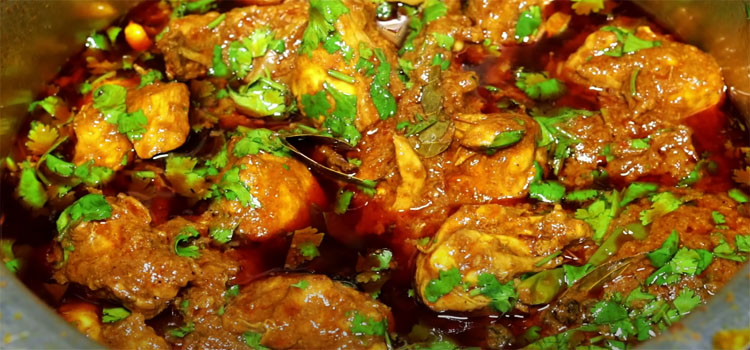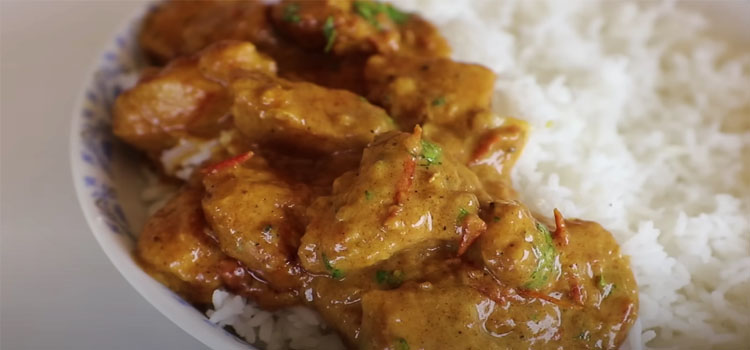Last Updated on September 15, 2024 by Shari Mason
How long can curry be stored in the refrigerator? This beloved dish boasts lush and aromatic flavors, just right for satisfying many palates.
Using my own experience, let’s uncover the timeline that keeps your curry safe, delicious, and ready for indulgence whenever your cravings strike.
How Many Days Can Curry Last In The Fridge?


Curry [1] can retain its deliciousness in the fridge for approximately 3 to 4 days.
By promptly transferring your curry into airtight containers and storing it at a proper temperature, you can ensure that each spoonful maintains its aromatic allure and delectable taste.
“Food makes travel so exceptional, because you get to taste what it’s supposed to taste like. Eating the real Pad Thai or finally having a proper curry is pretty amazing.”
– Meghan Markle, American Actress
Whether savoring it fresh or indulging in leftovers, this timeframe allows you to relish the magic of curry at its peak. But what are the peppers used in Indian food?
What’s The Best Way To Store Curry?
- Cool Down First: Allow freshly cooked curry to cool to room temperature before storing. This prevents moisture buildup and bacterial growth.
- Airtight Containers: Transfer the curry into airtight containers. Glass or plastic containers with tight-fitting lids help preserve the flavor and prevent external odors from affecting the curry.
- Portion Sizes: Divide larger batches into smaller portions. This minimizes the need to open the container, preserving freshness repeatedly.
- Label and Date: Label containers with the contents and the cooking date. This ensures you can easily track how long the curry has been stored.
- Temperature: Keep the fridge temperature below 40°F (4°C) to slow bacterial growth. Place the containers on a shelf rather than the door for more consistent cooling.
- Avoid Overcrowding: Avoid overloading the fridge with too many containers. Adequate air circulation helps maintain the quality of the curry.
- Avoid Stacking: Don’t stack containers on each other, as it can lead to uneven cooling and potential spillage.
- Freezing: If you don’t plan to consume the curry within a few days, consider freezing it in portion-sized containers. This can extend its shelf life to 2 to 3 months.
- Reheating: When reheating, ensure the curry reaches an internal temperature of 165°F (74°C) to eliminate potential bacteria.
Can Curry Be Frozen For Longer Storage?
Yes. Freezing curry is a brilliant way to extend its shelf life. Before freezing, ensure that the curry has cooled down completely.
Divide it into serving portions and place them in airtight, freezer-safe, or resealable bags.
Label them with the date to keep track. Properly frozen curry can retain its quality for about 2 to 3 months, allowing you to enjoy its rich flavors and spices even when you’re not in the mood to cook from scratch.
Related Posts:
- How To Make Garlic Naan With Grocery Naan
- How To Use Basmati Rice For Sushi
- How Long Indian Food Will Last In The Fridge
How Do I Know If Curry Has Gone Bad?


- Unusual Odor: If the curry emits a sour, off-putting, or foul smell different from its usual aroma, it’s a sign of spoilage.
- Change in Appearance: Observe the color and texture. If the curry has become discolored or has a slimy texture, it’s best to avoid consuming it.
- Off-Taste: If the curry tastes bitter, sour, or rancid instead of its usual delicious flavor, it’s an indicator that it might have gone bad.
- Mold Growth: Visible mold [2] on the surface or within the curry indicates that the dish has deteriorated.
- Bubbles or Gas: If you notice bubbles, gas, or an inflated appearance in the container, it could indicate bacterial activity and spoilage.
- Separation of Ingredients: If the curry’s ingredients appear to have separated or the sauce has become watery, it might suggest spoilage.
- Texture Changes: If the curry has become excessively mushy, slimy, or has an unusual consistency, it’s likely no longer safe to consume.
- Physical Sensations: Trust your senses and your body. If eating the curry causes discomfort, digestive issues, or any adverse reactions, it’s best to discard it.
- Expired Date: If you stored pre-packaged curry, check the expiration or “best by” date. While this doesn’t guarantee freshness, it’s a helpful reference.
- Bloating or Swelling: Cans or containers that are bloated, swollen, or compromised indicate bacterial activity and should be discarded.
“Curry, a symphony of flavors and spices, dances on the palate and in the fridge, staying vibrant for 3 to 4 days. Each spoonful is a fleeting masterpiece, offering a delectable reminder that culinary wonders are best savored in their prime.”
– Eat Pallet Restaurant & Food Advice
FAQs
u003cstrongu003eCan you eat 5-day-old curry?u003c/strongu003e
Eating curry that is 5 days old may not be advisable. u003cbru003eu003cbru003eWhile some cooked dishes can last up to 5 days in the fridge, curry’s ingredients and flavors can make it more susceptible to spoilage.u003cbru003eu003cbru003eBut u003ca href=u0022https://eatpallet.com/how-long-does-paneer-last-in-fridge/u0022u003ehow long can paneer last in your fridgeu003c/au003e?
u003cstrongu003eCan I reheat leftover curry?u003c/strongu003e
Yes, you can reheat leftover curry. Reheating leftover curry allows you to enjoy its flavors once again. u003cbru003eu003cbru003eEnsure you heat it to an internal temperature of 165°F (74°C) to eliminate potential bacteria. u003cbru003eu003cbru003eWhether using a stovetop or microwave, reheating your curry thoroughly ensures it’s safe and delicious for your next satisfying meal.
Key Takeaways
The shelf life of curry in the fridge offers a window of about 3 to 4 days, during which you can indulge in the rich tapestry of flavors and aromas it offers.
By adhering to proper storage practices, such as using airtight containers and maintaining a consistent fridge temperature, you can ensure that each spoonful remains a delightful experience.
Whether you’re savoring leftovers or planning your culinary escapades, this timeframe allows you to relish the magic of curry at its finest.
Remember, freshness and safety go hand in hand, making every curry creation a savory journey worth embarking upon.
References:
- https://www.thespruceeats.com/curry-powder-and-indian-food-1957468
- https://www.cdc.gov/mold/faqs.htm
- Can You Put an AC Unit in the Kitchen? - September 27, 2024
- What Cheese Does Olive Garden Use? Discover Their Signature - September 27, 2024
- How to Cancel a Pizza Hut Order? Quick & Easy Guide - September 24, 2024


